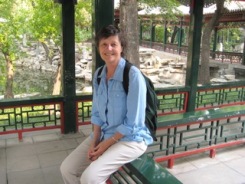A Dance with the Dragon: The Vanished World of Peking's Foreign Colony
Julia Boyd

With its fossil hunters and philosophers, diplomats, dropouts, writers and explorers, missionaries and refugees, Peking's foreign community in the first half of the 20th century was as exotic as the city itself. Always a magnet for larger-than-life individuals, Peking attracted characters as diverse as Reginald Johnston (tutor to the last emperor), Bertrand Russell, Pierre Loti, Rabrindranath Tagore, Sven Hedin, Peter Fleming and Wallis Simpson. The last great capital to remain untouched by the modern world, Peking both entranced and horrified its foreign residents – the majority of whom lived cocooned inside the legation quarter living an extraordinary existence fuelled by martinis, polo, jazz and adultery. Ignoring the poverty outside their gates, they danced, played and squabbled among themselves, oblivious to the great political events that were unfolding around them. Others, more sensitive to Peking’s cultural riches, discovered their paradise too late when it already stood on the brink of destruction. Although few in number, Peking’s expatriates were uniquely placed to chart the political upheavals – from the Boxer Rising in 1900 to the communist victory in 1949 – that shaped modern China. Through extensive use of unpublished diaries and letters, Julia Boyd reveals the foreigners’ perceptions and reactions – their take on everyday life and the unforgettable events that occurred around them.
Book Details:
- Author: Julia Boyd
- Published Year: 2012
-
Rights Sold
- UK: IB Tauris
- China: Commercial Press

Julia Boyd
Julia Boyd is the author of The Story of Furniture, (Hamlyn 1975), Hannah Riddell, An Englishwoman in Japan (Tuttle, 1995) The Excellent Doctor Blackwell: A life of the First Woman Physician, (Sutton 2005; Kindle edition Thistle Publishing, 2013) and A Dance with the Dragon: The Vanished World of Peking’s Foreign Colony (I.B. Tauris 2012; Beijing: Commercial Press, 2016). Currently a trustee of the Wigmore Hall, she is a former governor of the English-Speaking Union and a former trustee of the Winston Churchill Memorial Trust. She is married to Sir John Boyd, who served as British Amb...
More about Julia Boyd
Book Reviews
-
"Julia Boyd has unearthed an astonishing treasure trove of unpublished sources – papers in local record offices, letters in archives overseas, diaries in private hands – that lends her text a richness unmatched by comparable (and admirable) works such as Harriet Sergeant’s portrait of Shanghai or Artemis Cooper’s study of Cairo Moreover her characterisation is vivid and, in the context of momentous events such as Chinese revolution, Japanese aggression and global war, she brings to life a number of figures who lived outside the embassy compound… "
Piers Brendon, The Literary Review, -
"To Boyd’s credit her documentary material—extensive and usefully referenced—is deployed, in general, without editorial comment. The majority of the book is dedicated to the illustration of the tenor of life of the international population, from the tumultuous period of the Boxer rebellion in the first year of the twentieth century, through to the establishment of the People’s Republic of China on October 1, 1949. As such—and perhaps unintentionally—the book acts not only as a detailed history of the foreign presence in Beijing, but also as a readable introduction to the tumultuous history of China over the course of these years"
Jonathan Chatwin, Asian Review of Books -
"Another strength of the book lies in the author’s discovery and presentation of previously unpublished material from archives. Using such letters and diaries, she portrays a vivid picture of a life now vanished and places it the context of the chaos all round. The immediacy of these personal records brings people and events to life. It is as fun to read as it is enlightening."
Orientations Magazine -
"A fascinating account sourced from many previously unpublished letters and archives. Boyd’s characters flit on the surface of the city like water beetles, unaware of the depths below."
Frances Wood, author and former Curator of Chinese Collections, British Library -
"this well-researched, well-written and profoundly thought-provoking book, China expert Julia Boyd provides us with an important insight into the Chinese pathology with regard to outsiders."
Harvard Review